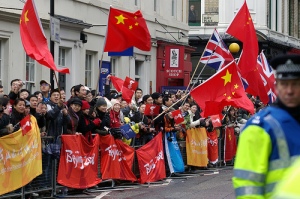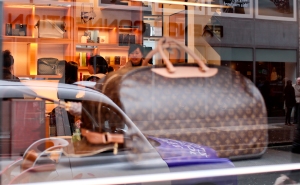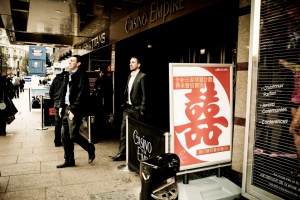Due to problems exist among Chinese international students, most reports of them by Chinese media are negative in. As a result, nowadays, this community group is stereotyped as rich and extravagant, lonely and selfish, ignoramus and irresponsible. These students born after 1980’s are regarded as the “lost generation”. However, this kind of judgement is only one-sided. Actually, there are still a large percent of Chinese students have become mature and aspiring during the period in the UK. They have done lots of meaningful things as well. In the previous articles, we discussed the phenomenon of gambling and luxury. This time, I’d like to share some stories that touched my heart.
Story 1
My friend Liang Liu attended the graduation ceremony of the University of Warwick in January, and told me an impressive story. In the ceremony, Warwick announced that it was to establish a special scholarship fund in honour of Li Xiaoming. Li was killed in Haiti while serving as a Chinese peacekeeper on 12 January, and he was due to be awarded his degree at the ceremony on 21 January.
Warwick’s Vice-Chancellor, Nigel Thrift, said: “The sudden death of a student brings great sadness to all those who knew them. Xiaoming was a compassionate, kind and caring individual, dedicated to his peacekeeping work and with many friends both inside and outside the University. Our thoughts are with Xiaoming’s family and friends at this sad time.”
Story 2
In the December of 2009, Lenovo’s held a Youth Entrepreneurship Challenge in China, and finally ten teams won 100,000 yuan as prize. One of the team is different, as it is consisted of Chinese overseas students. Their project is called Uni-union, aiming to establish an interactive platform for Chinese university students to share academic resources. At the same time, 80 per cent of the advertising income will be donated to the children living in the remote villages in China.
David Chang, the founder of the project from the Imperial Collage, explained his idea that “ I know many Chinese students cannot access to an efficient platform where provide enough information to meet their needs for both study research and interest development. I want to take advantages of Social Networking services, and contact the worldwide famous universities, institutions and organizations to help Chinese students build an academic social network online.” Ming Luo, the captain of the team is studying in the Cambridge University added, “Charity is another important aspect of our project. The education conditions and facilities in some rural areas in China are still very poor. I hope I could make some contributions to those children who cannot have the equal education as me.”
Story 3
In May 2009, the two confirmed cases of H1N1 flu on the Chinese mainland were both overseas students who came home on vacation, raising worries that the return of more students will increase the risk of the virus spreading to the mainland. Online debates have raged over whether it was right for a 19-year-old student Lu from a Canadian university to expose potential victims to the virus. Some Chinese netizens even criticized that these international students are lack of civic responsibilities and moral standards. Many overseas students felt angry and upset about these comments.
Though Chinese were a bit over-reacted about H1N1, many Chinese students studying overseas delayed their trips back to China. Simon Zhang delayed his plans to go back Beijing from London, he said “We are in the flu-affected area, being more cautious is the right thing to do. I want to be responsible to our motherland and to my family.”
Story 4
2008 was a year that many significant things happened in China. Because the related actions taken by overseas students, from then on, previous negative attitudes towards these young people has started to change. When the Olympic flame arrived in London in April of 2008, thousands of Chinese students greeted and guarded the Olympic torch. When the Sichuan earthquake happened, Chinese students in London organized the activity to donate money and mourned for victims. The total amount of money collected from the UK was nearly 1.5 million pounds. Faced with the argument about do not love China, overseas students proved their patriotic minds.
 Chinese students attended the Olympic Torch Relay in London
Chinese students attended the Olympic Torch Relay in London
 Chinese students mourned for earthquake victims
Chinese students mourned for earthquake victims
 Students made a Chinese map by candles and sent flowers
Students made a Chinese map by candles and sent flowers
I hope these four stories can present another aspect of Chinese students life in the UK, and the long-existing misunderstanding of them could be reduced.
 Eason Chan gave thanks to his audience at Royal Albert Hall
Eason Chan gave thanks to his audience at Royal Albert Hall Over 5,000 Chinese students attended his concert, and felt happy to see their idol.
Over 5,000 Chinese students attended his concert, and felt happy to see their idol.










